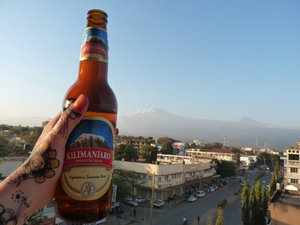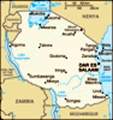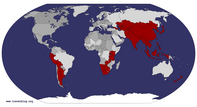Advertisement
Published: December 15th 2013

 Drinking a kili in front of kili.
Drinking a kili in front of kili.
Yes, that is henna on my hand. Yes, it's a bit Gap Year.Africa has a special way of making you feel small. The size and scale and magnitude of things becomes overwhelming. Not just the natural landscape… the cities, the people, the incomprehensible statistics. Spending six weeks gazing up at Kilimanjaro is guaranteed to alter your sense of perspective.
The mountain isn’t a permanent presence. Hidden in clouds much of the time, it occasionally reveals itself, silently, taking everyone surprise. Walking home, someone will suddenly shout “Kili’s out!” and we all turn and stare. As if someone had just spotted an illusive safari creature which could disappear back into the bush at any moment. In this way you never become accustomed to the mountain. It will make you stop and look, every time.
After my little detour to Zanzibar I arrived in Moshi, to spent time at the hospital which takes its name from the mountain. This is the real reason I came to Tanzania. For three months I’m a student again, this time with the London School of Hygiene and Tropical Medicine on their new East Africa Diploma. The LSHTM is a world renowned institution which has been teaching trop med for over 100 years, but exporting the course from
London to East Africa is a very recent and slightly experimental development. The LSHTM diploma is fairly legendary in medical circles and I’d had my heart set on doing the London version ever since I was a little med student, so you can imagine my delight when I discovered it was now possible to do this amazing course on location in Tanzania and Uganda. I applied, didn’t get an offer in the first round (it’s competitive, especially for very junior doctors like myself) then spent a month in limbo on the waiting list before finally gaining a place.
I arrived very late the night before the course started, cutting it fine as usual. My hotel room came equipped with an exceptionally dim lightbulb which only served to change the colour of the darkness. The bed net had the reverse effect to that intended, trapping all the insects inside itself like some kind of mosquito aviary. I shared the room with a miniature gecko the size of my thumbnail, who I repeatedly failed to catch and was constantly terrified of squishing by accident. The next morning I was tired from my total failure to sleep, but almost hyperactive with excitement.
I wanted to do this course so badly, I was still having a little trouble believing they actually let me on. The other students seemed to far outshine me in terms of achievements and experience of international medicine. Some were already Infectious Diseases registrars, GP partners, experienced docs who’ve worked in humanitarian emergencies, or even worse… other people my own age and level who’ve already done impressive things. So many interesting stories. So many big personalities. I began to feel unworthy, like I must be here by accident due to some kind of administrative error.
The students were from all over the world. America, Canada, Australia, New Zeland, Germany, Austria, Japan, Brazil, Tanzania, Uganda, Kenya, Zambia, Sudan. Sixty of us in total. Unfortunately, having to learn 60 new names in one day is my idea of hell. I cheated, and looked everyone up on the Facebook group to boost my memory. One third of the class was made up of local doctors, East Africans on scholarships. This is one of the special features that makes the course amazing and unique. I end up learning as much from them as I do from our tutors, but at first I worried

 Lunchtime
Lunchtime
This is where we ate lunch together every day.that they couldn’t possibly be gaining as much from the diploma as we were. Do they really need to be taught how to treat Malaria? These guys are expected to do things as medical students that I couldn’t even begin to attempt now. They’re used to dealing with severity of disease and working conditions far beyond anything I’ve ever encountered. Surely, to them, a lot of this stuff is routine? Later on, I realise that it’s about much more than that.
Day one was like the first day of school. Everyone piled into the official KCMC bus, jittery and full of energy, all talking at once. Nobody wanted to sit in the first row of seats in the classroom. There was great excitement about buying stationary. The pure geekiness in the room was palpable.
During a somewhat lengthy opening speech by the hospital’s medical director, there was a massive crash from the back of the room. Everyone spun around in their chairs. The table with all our textbooks piled on it had collapsed under their immense weight, spilling an avalanche of bright purple breezeblock sized hardbacks onto the floor. This, surely, was not a good sign. I began
to realise how much there was to learn.
The course does turn out to be pretty hardcore. Swahili lesson every day, 8am. Classes 9am till 5pm. Enthusiastic socialising from 5pm till late. All 60 of us studying, living, eating and playing together, spread over three hotels in town. It’s all very intense. By the end of the first few weeks I have become fully institutionalised, and can no longer imagine my life before or after the course. Disturbingly quickly, it becomes all consuming. But I don’t really mind.
Our Swahili lessons had a touch of the bizarre about them. There was a lot of enforced singing. In one of the first classes our teacher patiently went through all the sounds in the Swahili alphabet, then encouraged us to combine them at random to create words. We took it in turns to pronounce what we had come up with, and he translated for us. One student hopefully suggested a string of letters which our teacher calmly informed us is the verb “to decapitate someone and put their head on a spike”. I would rather have learned how to order a beer, but at least this was entertaining.
The
medical lectures were delivered by a combination of local doctors and world experts flown in from London and elsewhere. By the end of the first week we’ve had a crash course in Epidemiology, brilliantly taught. Concepts that never quite made sense to me swim into focus when we’re asked to apply the statistics and work through a real life scenario, using epidemiological data from the first ever recorded outbreak of Ebola virus. After this came a week of Malaria, fascinating and confusing in equal measure. More than once I had an anxiety dream in which I’m swirling around uncontrollably in a giant diagram of the falciparum lifecycle. I wake from this suddenly in the night, mosquitoes buzzing in my ears.
Then came my first day on the wards. Compulsory white coat, borrowed, extra-extra large. Floor length skirt, in order to abide by the hospital dress code. Glasses that have been snapped in two places then superglued back together. Sweating in the tropical heat. Beds are pushed together so closely that we have to turn sideways to get inbetween them. I compulsively squeeze the hand sanitizer dispensers on the wall, even though they’re always empty. It’s a reflex. We see four cases of tetanus in different stages of progression, neatly lined up next to each other on ITU. A perfect teaching aide and a senseless tragedy, given than an effective vaccine has been available for 50 years. Nobody should being dying of this, anywhere in the world. We see a young Masai boy with spinal TB who’s parents didn’t bring him to hospital until several months after he’d lost the use of his legs. Everything in the hospital costs money. Even transport to get here is more than some can afford. Many patients bear the neat, symmetrical patterns of scars left by rituals of traditional healers, often their first port of call out in the villages. I suddenly felt so grateful that I have never had to consider whether it’s better to bankrupt an entire family in order to do the test I need to be sure of my diagnosis, or treat presumptively and risk the patient’s life. I quietly promised myself that I was going to thump the next person I hear complain about the NHS. Even if it is my consultant.
This is all I ever wrote about Moshi before my blog got abruptly abandoned. The course was exhilarating but exhausting, and I had too much work (and too much fun) to sit down and write. But one of my KCMC friends complained that Kampala got its own blog entry whereas Moshi didn’t, so I thought I’d upload this, incomplete though it may be. I’ve written more about medicine in Africa, but this is a travel blog so I’m not sure this is the right place for it. I am slowly catching up with the rest of my travel stories though, transcribing notes from my phone and bits of scrap paper onto the blog. I'm in Malawi at the moment, running about two countries behind. Sorry, Mum and Dad, and anyone else who actually reads this. I am trying.
Advertisement
Tot: 0.06s; Tpl: 0.012s; cc: 9; qc: 24; dbt: 0.0382s; 1; m:domysql w:travelblog (10.17.0.13); sld: 1;
; mem: 1.1mb












Home and Away
Bob Carlsen
Thanks for the blog...
we are reading them.